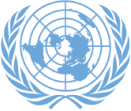It is a great pleasure for me to address the General Assembly under the presidency of a fellow citizen of our Caribbean Community. Allow me to extend our warmest congratulations and good wishes to you, Sir, as you discharge the functions of your high office.
I offer our esteemed Secretary-General our appreciation for his astute and steadfast leadership in these times of great challenge to the Organization. I would also like to pay tribute to his dedicated staff, many of whom have lost their lives in service to the United Nations.
In 1953, the people of Guyana were allowed for the first time to exercise their democratic franchise under universal adult suffrage to elect the Government of their choice. Today, 50 years later, my country has learned, through the painful experience of misrule and mismanagement, the vital importance of democracy to our future as a nation. We recognize that to foster development, reduce poverty and safeguard human dignity, democracy must be allowed to grow and take root. Having laid the basic foundation for good governance through free and fair elections, we now face the task of building a more prosperous and just society.
To that end, my Government has embarked on a process of consultation and collaboration with all sectors of our population, including political parties, the private sector and non-governmental organizations. Through the recent reform of the Constitution, provisions have been made to enhance fiscal transparency, provide greater inclusiveness and guarantee the fundamental rights of our people. Those measures include six independent commissions on human rights, ethnic relations, women and gender equity, indigenous peoples, the rights of the child and public procurement.
Moreover, in an effort to foster greater social cohesion in Guyana, we recently invited the United Nations Special Rapporteur on Racism to visit and engage the various sectors of Guyanese society so that the international community can be informed of the broad perspectives of our multicultural society and of the several measures which the Government has put in place to promote interracial harmony.
In further consolidation of the democratic process, my Government has embarked upon a programme to reform the justice and security systems in our society by building capacity for the prevention, investigation and resolution of crime and for the improvement of the administration of justice. Much has been accomplished in that area, but much more remains to be done.
At the same time, we have taken several development initiatives that will ultimately lead to a better life for all our people. Among them are the national development strategy and the poverty reduction strategy. We have worked hard to provide better housing, health and education facilities for our people and have managed to make signal progress in reducing poverty. And by stimulating investment, we are creating new opportunities for development. We now look to the future with the renewed hope that we will be able to overcome the many challenges to our political, economic and social progress.
However, in the face of a persistent debt burden, drastically reduced development assistance and ever present protectionist barriers, and in the prevailing climate of international tension and uncertainty, many developing countries, Guyana included, are made more vulnerable, and prospects for growth are severely impaired. The failure of the recently concluded Cancún Conference does not make us sanguine about the future. The international community is now hardly likely to reach the Millennium Declaration targets that were set by this Assembly three years ago.
The fate of nations, especially of those as small as ours, lies not in our hands alone. The process of globalization has made us acutely aware of the need for greater interdependence and international cooperation if we are to survive the many threats to our welfare. That interdependence is the basis for multilateralism and for the United Nations.
The Charter of the Organization reflects our collective commitment to cooperate to promote peace and development. However, we have yet to fully honour that commitment. Regrettably, the world in which we live now, while placing a high premium on democracy at the national level, fails to live up to that ideal in the international councils that shape our common destiny. We are concerned at that double standard, as the aspirations of humankind for peace, security and development cannot be fulfilled without the effective participation of all States in global affairs.
Especially disconcerting is the practice by some countries and international financial institutions to rely on anecdotal or partial information — often from questionable sources — to assess the performance of a given country. Needless to say, that can be very damaging to the particular economy concerned, as it effectively deters further aid and investment. Similarly, we are concerned by the inordinate delay in the release of development funds. The Heavily Indebted Poor Countries Debt Initiative, which was conceived as a means of assisting seriously indebted poor countries, has been unconscionably delayed. Meanwhile, the poor of our countries must face continuing hardship and suffering. They cannot be held hostage for much longer.
The success of international cooperation, and indeed of the United Nations system, will be determined by how well they respond to the interests and concerns of not only the powerful but also the powerless, and not only of the rich but, most urgently, of the poor. If truth be told, their record thus far leaves much to be desired. It is therefore imperative that a credible and effective system of global governance be established as quickly as possible. That will require a more fundamental reform of the United Nations, and indeed of the entire multilateral system, than we have seen so far.
After several crises in the decade of the 1990s, there was a strong call for reform of the international financial architecture to provide greater macroeconomic stability. The urgency of the campaign appears to have diminished, however, even though the threat of further calamity remains. Attempts to strengthen the role of the United Nations in the development process now lag behind, denying our countries a greater say in the decision-making process pertaining to issues that affect our welfare. Nor have we been able to develop an effective security system to protect countries, particularly the weak and small, from encroachments on their sovereignty and territorial integrity.
Our world continues to be subject to a wide array of threats to international peace and security. We recently witnessed a series of terrible human tragedies. Many thousands have died as a result. If there is one lesson to be learned, it is that violence accomplishes nothing. Only through dialogue and negotiation, bolstered by social justice, can lasting solutions to those problems be found. It is therefore imperative that the United Nations, the multilateral Organization to which we all belong, be strengthened to effectively promote peace and development.
It is time that the United Nations Security Council, which has the primary responsibility under the Charter for international peace and security, be made more representative of the wider international community. The Council must be expanded, and the role of developing countries in that body appropriately strengthened. To that end, Guyana is prepared to support the candidacies of Brazil, India and an African country for permanent seats on the Council, as well as a suitable number of non-permanent seats for other developing countries. That expansion will no doubt enable it to better cope with the challenges that conflicts, both old and new, pose to global peace and development.
Neither the many speeches that we make nor the several strategies that we occasionally devise in the hope of building global peace and development will ever accomplish much unless they are followed up by appropriate action. Sad to say, our frequent declarations of intent are not matched by deeds, a failure that can be explained only by the lack of serious purpose on the part of many Member States. We have yet to transcend selfish national interests to reach a higher plane of interdependence and multilateralism. I urge the international community to rethink its policies and to seriously consider the advantages of a more balanced and equitable system of relations.
The world in which we now live calls for greater international solidarity and cooperation, not less. We must therefore ensure that those ideals are at the forefront of our deliberations at the General Assembly and that we take practical steps to ensure and strengthen our common home, the United Nations.


